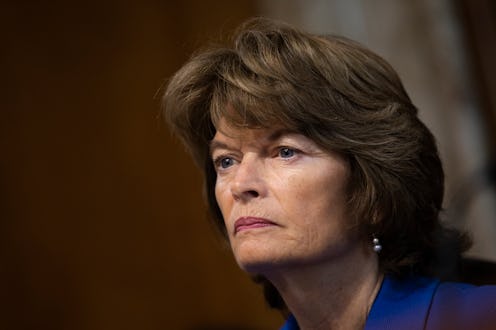News
Congress Will Get Another Chance To Pass The Bill Tackling Violence Against Native Women

Alaska Republican Sen. Lisa Murkowski is reigniting legislative efforts to curtail violence against Native American women. According to The Huffington Post, Murkowski will reintroduce Savanna's Act, a bill addressing violence against indigenous women in America, that was originally introduced by North Dakota Sen. Heidi Heitkamp in 2017.
Savanna's Act was named after 22-year-old Native American woman Savanna LaFontaine-Greywind, who was abducted and killed in 2017. LaFontaine-Greywind's death sparked outrage across the country, and activists viewed it as another incident of brutal violence against Native American women.
In a statement from her office, Murkowski told the Huffington Post that the legislation "[Heitkamp] has helped to advance, I am going to encourage every step of the way, aggressively and early."
It appears that it will be a bipartisan effort — Murkowski said that she would look toward her Democratic colleague, Sen. Maria Cantwell of Washington, for assistance. "I’m looking for partners. I’ve already talked to Sen. Cantwell, she’s willing to join up with me," she said in her statement.
Though the bill initially had bipartisan support (it breezed through the Senate), it has faced opposition from a single lawmaker. In December, Heitkamp, who lost her reelection bid in November, said that Virginia Rep. Bob Goodlatte had blocked the bill. Goodlatte, whose retirement later this month means he's leaving his seat as chairman of the House Judiciary Committee, stalled the act, citing issues with some of its language.
A House Judiciary Committee aide told the Huffington Post, "We have been working on this bill in order to advance it, including working with [the Department of Justice] and stakeholders to address issues with the language."
In its official text, Savanna's Act states that the Department of Justice must enhance its official approach for studying and addressing the issue of missing and murdered Native American women.
Savanna's Act also factors in the need to consult with indigenous tribes about this issue. The bill states that the department must provide "tribes and law enforcement agencies with training and technical assistance relating to the development and implementation of the law enforcement and justice protocols."
The legislation would also set up crime databases for locals to stay updated with based on their counties. In other words, it would be a multifaceted approach and, as the Huffington Post reported, it wouldn't require any extra federal funding.
In a December press conference after the Senate passed the bill, Heitkamp brought attention to a National Institute of Justice study that detailed the alarming amounts of physical, sexual, and psychological violence affecting indigenous women. A staggering 84.3 percent of Native American women polled in the study claimed they had undergone violence during their lifetimes.
Although Heitkamp lost her bid for reelection, her legislative efforts continue to receive support from her colleagues. Come Jan. 3, with a Democratic majority in the House and Goodlatte no longer on the Judiciary Committee, Savanna's Act has another chance at being passed.
For now, Murkowski seems eager to keep soldiering on. According to the Huffington Post, Murkowski said, "We’re going to be working it. We’re going to be working it early. We're going to make the difference."